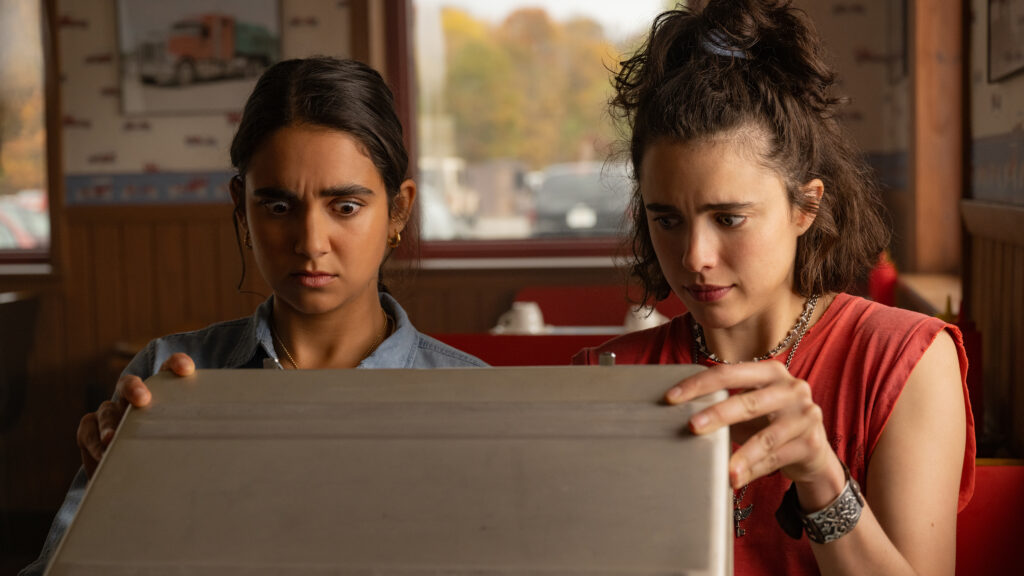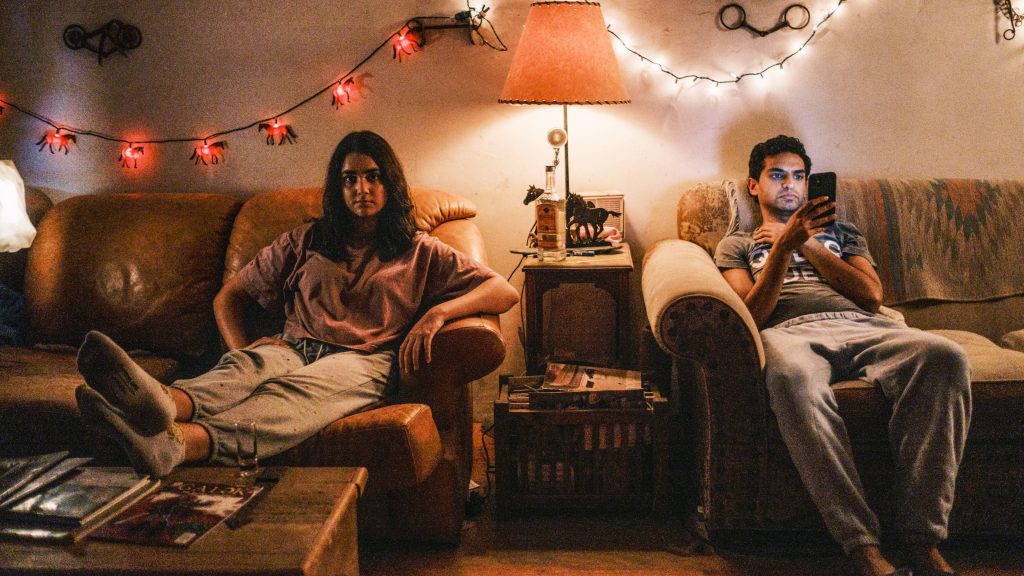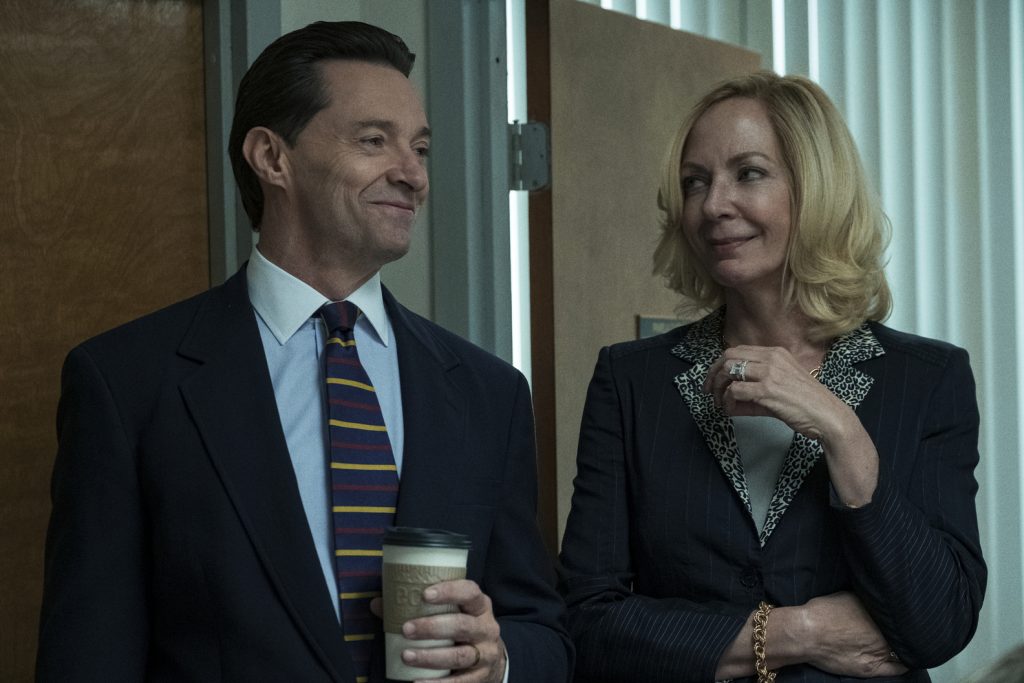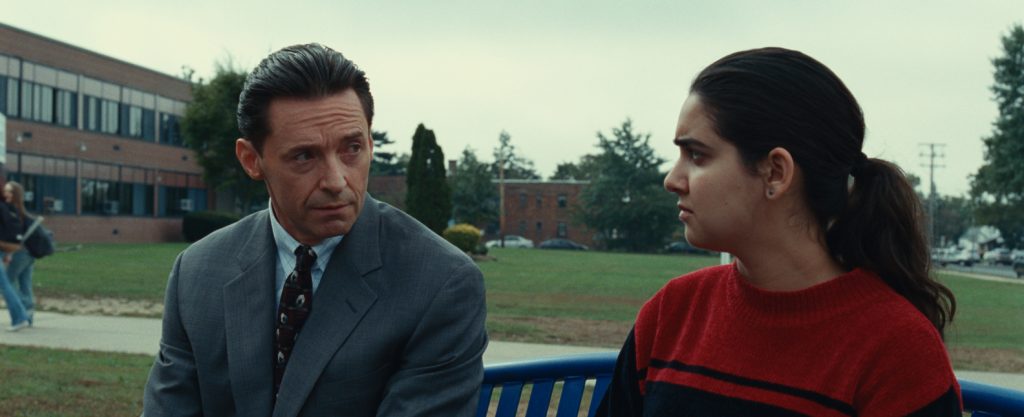February 23, 2024
by Carla Hay

Directed by Ethan Coen
Culture Representation: Taking place in December 1999, in various states on the East Coast of the United States, the comedy film “Drive-Away Dolls” features a predominantly white cast of characters (with some Asians, African Americans and Latinos) representing the working-class, middle-class and wealthy.
Culture Clash: Two lesbian best friends go on a road trip from Philadelphia to Tallahassee, Florida, and find out that they are being chased by criminals who want some things that are in the two friends’ rental car.
Culture Audience: “Drive-Away Dolls” will appeal primarily to people who are fans of the movie’s headliners, filmmaker Ethan Coen and comedies about road trips or lesbians.

Neither terrible nor great, “Drive-Away Dolls” can have some appeal to viewers who are open to raunchy road-trip comedies that have lesbians as the central characters. The wacky tone is off-kilter, but the dialogue and characters are snappy and memorable. The “Drive-Away Dolls” filmmakers have said that it’s intended to be a B-movie (in other words, kind of trashy and kind of goofy), so people won’t have any expectations that “Drive-Away Dolls” is aspiring to be award-winning art.
Directed by Ethan Coen, “Drive-Away Dolls” is his first movie as a solo director since he ended his filmmaking partnership with his older brother Joel Coen. Together, the Coen Brothers’ specialty was making often-violent movies about offbeat characters, with their most-lauded achievement being the 2007 Oscar-winning drama “No Country for Old Men.” Other well-known movies in the Coen Brothers’ filmography include 1996’s crime drama “Fargo,” 1998’s stoner comedy “The Big Lebowski,” 2000’s prisoner escapee thriller “O Brother, Where Are Thou?” and the 2010 remake of the Western “True Grit.”
“Drive-Away Dolls” isn’t nearly as good as the above-named films, but it does have some quirky charm. (The word “quirky” is an over-used description for a Coen movie simply because it describes so many Coen movies.) The trick is how in how much quirkiness can be put into a movie before it becomes very irritating. “Drive-Away Dolls” comes dangerously close to being a constant barrage of quirkiness for the sake of trying to look unconventional. However, the movie takes a turn toward the end that is very conventional, so don’t expect any major plot twists.
Ethan Coen and his wife Tricia Cooke co-wrote the “Drive-Away Dolls” screenplay and are two of the movie’s producers. Cooke identifies as openly queer (as she says in the movie’s production notes and in many interviews), but the movie sometimes looks like it’s treating its lesbian characters (who are all young, under the age of 30) as caricatures. How would “Drive-Away Dolls” be if it had been written by young lesbians instead of a middle-aged husband and wife? We’ll never know, but some of the scenes with sexual activities just seem to be in the movie in a self-conscious way, as if to say: “Look at how progressive we are with these lesbian scenes.”
The racy sexual content can’t quite cover up the obvious: “Drive-Away Dolls” is essentially using the same formula that many road-trip movies have with two people as the central characters: The two people, who usually have opposite personalities, bicker with each other and bond with each other, as they face various obstacles on the way to their destination. If there’s a possibility of romance between the two people, one of the people in this relationship denies or resists the attraction.
In “Drive-Away Dolls,” the two argumentative travel partners are lesbian best friends in Philadelphia—brash and horny Jamie Dobbs (played by Margaret Qualley) and uptight and prudish Marian Pulabi (played by Geraldine Viswanathan)—who go on a road trip together to visit Marian’s aunt in Tallahassee, Florida. Jamie wasn’t officially invited by this aunt, but Jamie persuaded Marian to let Jamie go on this trip. Marian tries to dissuade Jamie from going by saying the visit will probably be boring because Marian’s aunt is a birder who is very conservative. Viewers soon learn that once Jamie has put her mind to getting something, she goes after it with gusto.
Jamie is what some people might call a “sexual free spirit” and what other people might call “promiscuous.” It’s the reason why Jamie’s most recent heartbroken girlfriend Suzanne “Sukie” Singelman, a Philadelphia police officer, has broken up with live-in lover Jamie, who admittedly has a hard time with being monogamous. Early on in the movie is a sex scene between Jamie and a woman named Carla (played by Annie Gonzalez) that has partial nudity but leaves very little doubt about what’s going on in the bed.
Jamie is so well-known at a local lesbian nightclub called Sugar’n’Spice, there’s a scene where she gets in front of a cheering audience to show off some souvenirs of her sexual exploits. Also in the crowd are Marian and Carla, who mildly scolds Marian for being at the club in a business suit. Marian’s excuse is that she just came from her office job and she’s not interested in “peddling her wares” at this pickup joint. Meanwhile, Sukie is so incensed at Jamie’s bragging antics on stage, Sukie storms up to Jamie and punches her.
Sukie has ordered Jamie to move out of the apartment. When Jamie arrives with Marian to pick up Jamie’s belongings, Sukie is trying to unfasten the bolts of a dildo that has been bolted to the lower half of a wall. This sex toy was a gift from Jamie, but Sukie angrily says that she doesn’t want it anymore. It’s intended to be a funny scene in “Drive-Away Dolls,” but if this type of thing doesn’t make you laugh, then “Drive-Away Dolls” is not the movie for you.
Sukie and Jamie also have a pet Chihuahua named Alice that Sukie doesn’t like, but Jamie is reluctant to take the dog because Jamie knows how irresponsible Jamie is. This dog isn’t used for a comedy gimmick as much as you might think it could be. Feeling some break-up blues, Jamie convinces Marian to let Jamie go on this road trip with Marian to Tallahassee.
The very first scene of “Drive-Away Dolls” shows something that is the catalyst for the danger that Jamie and Marian encounter on this trip. A man calling himself Santos (played by Pedro Pascal), but who is listed in the movie’s end credits as The Collector, is sitting by himself at a darkly lit Italian restaurant called Cicero’s and is waiting nervously for someone who doesn’t show up. Santos is clutching a silver metal briefcase. As he leaves the restaurant, he finds out too late that his waiter (played by Gordon MacDonald) was really an assassin, who followed Santos into an alley and killed him in a very gruesome way.
What happened to Santos’ body and the briefcase? And what’s in that briefcase? Those questions are answered in the movie. It’s enough to say that Marian and Jamie go to a car rental place owned by a shifty-looking man named Curlie (played by Bill Camp), who hears that two women are going to Tallahassee. Curlie knows exactly what car he’s going to give them: an aquamarine blue Dodge Aries.
Not long after Marian and Jamie drive off, three criminals show up expecting to rent this Dodge Aries, and “Tallahassee” was their code word to get the car. There are certain things in the car’s trunk that these thugs want. After Curlie tells them all he knows about the travelers who rented the car, Curlie gets savagely assaulted for the mistake of renting the car to these unsuspecting women.
The three criminals who are on the hunt for Jamie and Marian are a cold and calculating killer called The Chief (played by Colman Domingo), an impatient hothead named Flint (played by C.J. Wilson) and a dorky henchman named Arliss (played by Joey Slotnick), who all work for a mysterious boss who is later revealed in the movie. The Chief, Flint and Arliss start their chase by going to the apartment of Sukie, who was listed as the emergency contact person for Jamie and Marian’s car rental.
“Drive-Away Dolls” stretches out the “opposites attract” schtick between Marian and Jamie for as far as it can go. Marian is horrified when Jamie immediately defaces the car with this graffiti message on the trunk: “Love is a sleigh ride to hell.” Jamie is horrified when Marian admits that she’s been celibate for three years, ever since Marian’s breakup from her ex-girlfriend Donna. During their road trip, Jamie wants to have fun at lesbian bars and pick up sex partners, while Marian would rather sit in bed at night and read a book. The movie makes a big deal out of the fact that Marian is reading Henry James’ “The Europeans” during this trip.
“Drive-Away Dolls” also has psychedelic-looking interludes that feature brief, uncredited appearances by Miley Cyrus as a hippie woman from the 1960s. Her character’s name is later revealed in the movie. The name has a connection to a famous real-life 1960s groupie who died in 2022. If you watch all of the movie’s end credits, you’ll see at the very end, “Drive-Away Dolls” has a caption that shows the movie is dedicated to this real-life groupie.
Fans of Matt Damon (who plays a politically conservative U.S. senator from Florida named Gary Channel) and fans of Pascal should know that the screen time for Pascal and Damon in “Drive-Away Dolls” is limited to less than 10 minutes each, even though Pascal and Damon share top billing in the movie. It’s a “bait and switch” that will turn off some viewers who might be fooled into thinking that Pascal and Damon have a lot of screen time in the movie.
“Drive-Away Dolls” has fun with being campy, but some scenes are kind of useless. For example, Jamie and Marian encounter a traveling all-female soccer team whose members look like they’re in their late teens. Jamie and Marian end up in a hotel room with the team and their young coach, while they all take turns making out with each other.
Everyone on the soccer team is queer? Really? It looks so unrealistic and gratutitous, just for the sake of having a scene showing young women making out with each other in the same room. And what happened to Marian being so uptight? (She’s not drunk in this scene, so intoxication isn’t an excuse.) This is the type of scene that could have been edited out of the movie, and it would have made no difference to the overall story.
Qualley’s acting in “Drive-Away Dolls” looks like she’s trying to mimic the blunt-talking, verbose style of Mattie Ross, the precocious teen character played by Hailee Steinfeld in 2010’s “True Grit.” There’s a clipped, galloping pace to the way they talk that is not unlike the pace of a Kentucky Derby race horse and comes complete with a Southern twang. Jamie is originally from Texas, but her thick Southern accent (which doesn’t sound completely convincing in Qualley’s performance) and Jamie’s personal history with the South aren’t fully explained, considering that the movie makes insulting comments about Florida.
Qualley looks like she’s trying too hard to be funny as Jamie, while Viswanathan has a more naturalistic (and better) comedic style as Marian, who can say more with a few cynical eye rolls than Jamie can say with any of her motormouth rambling. Jamie’s dialogue can be hilarious at times, but it’s very stagy, much like a lot of the comedy in “Drive-Away Dolls.” All the movie’s supporting characters are not developed enough to have full personalities. Just like a slightly rusty car, “Drive-Away Dolls” is a comedy that spurts and lurches and takes a while to rev up, but it eventually can take you on a path that goes where it’s expected to go.
Focus Features released “Drive-Away Dolls” in U.S. cinemas on February 23, 2024. The movie will be released on digital and VOD on March 12, 2024. “Drive-Away Dolls” will be released on Peaock on April 12, 2024, and on Blu-ray on April 23, 2024.






